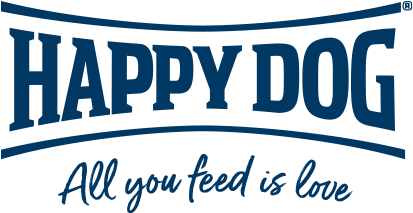Tubby Dog – So What?!
Of course – how many of us can claim to be an ideal weight? Don't we still know that it’s unhealthy for the ‘fat layer’ to become too thick? The back, the joints, the heart, the circulation, the liver… And it’s a vicious circle, as the more excess weight you carry around, the more sluggish you become, and the more likely you are to put on more weight – dogs are no exception! First of all, no-one intentionally sets out to make their dog fat! But every one of our overweight canine friends was once slim! So what happened? It could be an increase appetite after castration, or some dogs digest their food more efficiently – and therefore are more likely to put on weight! Or for professional, private or health reasons you found you had less time for walks. Sometimes it was an illness of the dog (heart condition, joint problems, insufficient thyroid function, etc.), which caused an increase in weight. What makes it so dangerous is that whatever the cause of the increase in weight, it is a gradual process! As we see our dogs every day, we don’t notice anything at first. It is not until our friend’s visit us or we take the dog for his annual injection at the vet’s that we are confronted with the blunt remark: ‘Hasn’t your dog put on weight!’ ‘No, not really! - Or has he? When did we last actually weigh our ‘Rover?’ …Quite a while ago…’ What all these stories have in common is the fact that the dogs were not regularly weighed, and that – often through ignorance – the food quantities remained the same even though the animal’s circumstances and therefore feeding requirements had changed! Dogs that are not very active and due to an operation, hormone deficiency or change in metabolism start to put on weight more easily, must be fed with greater care! We’ve put the following steps together to help you:
- Check Your Dog’s Weight Regularly
- Ideally once a month. Small dogs can be weighed by holding them in your arms. Weigh yourselves together, and then weigh yourself without the dog. The difference corresponds to the weight of the dog. It is best to have large dogs weighed at your vet’s – this is usually free of charge. This also has the added advantage that your dog will learn that he does not have to be afraid of every visit to the vet!
- Get into the Basic Habit of Feeding Less!
- Bear in mind that the feeding quantities given on the packaging are only theoretical values, based on an average, healthy dog receiving adequate exercise (in the case of complete food for the normal, active dog). It could be that because of the circumstances your dog needs substantially less! Also, the feeding quantity guidelines are based on the food being given as a complete food. That means he does not get anything else! If you give your dog treats, snacks or rewards in between, the quantity of the main meal must be reduced accordingly!
- Never Forget WHY it’s so Important for Your Dog to Lose Weight
- It’s for his own good! You are not tormenting your dog with an appropriate diet and sensible behaviour! Although he may not understand that you are doing him good with this, he will nevertheless get used to it!
- Distract your dog!
- We, too, find it easier to stick to a diet if we are not thinking about food all the time or watching others eat! For example, let him out into the garden during family mealtimes so that he doesn’t beg. This will also make it easier for you not to feed him extras!
- If Your Dog’s Health Allows, Ensure he Gets More Exercise!
- Accompanying you on bike rides, ball games, longer walks, etc. However, make sure that unfit animals are trained gradually! If you don’t have enough time yourself, ask friends or relatives or even a professional dog walker. You may even find a neighbour’s child would be delighted to take your dog for walks!
- Choose a Light, Reduced Calorie Food with a Low Fat Content
- Wherever possible the fat content should be no more than 7 %, as fat is a particularly common source of many unnecessary calories! Also take care to ensure that, in order to achieve a reduction in weight, when consulting the guideline table on the pack to calculate the daily feeding quantity, you should use your dog’s ideal weight, not his present weight. Otherwise, he will not lose weight, even with reduced feeding, but at best he will maintain his present weight. For dogs which have a greater tendency to gain weight the quantity of food must be reduced even further. If the dog does not lose weight in spite of a strict diet, you should consult your vet, as there may be a metabolic disorder (reduced thyroid function). For weight loss, try Happy Dog Calorie control
13. Home Cooking for Your Dog is not Advisable
Unless you are given a detailed portion calculation by a dietician, as proteins, fats, carbohydrates, vitamins, minerals and trace elements must be given in the right proportions. Unbalanced nutrition over an extended period can often have serious consequences!
14. The Way to a Dog’s Heart is Through his Stomach!
But don’t be fooled into thinking that lovingly-prepared home-cooked food, shared daily evening meals or doggy snacks are the only way of showing your appreciation to your dog! Demonstrate your affection in more healthy ways! Give him plenty of attention! This is the best way of laying the foundations for many happy, and above all, healthy, years together! The HAPPY DOG Team wishes you every success!

